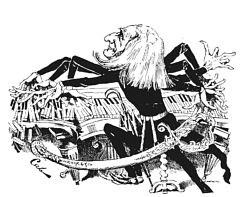So there we are in the theater. The lights coming up just a few seconds too soon and making clearly visible two black-clad dressers meant to be offstage before the light arrives. A little glitch in seamless perfection. And then what? Pretend it didn’t happen? Hope no one saw them? Or, on the fly, damage the seamlessness even more and send the dressers out again later on in the show? Most big theater productions have trouble with that kind of spontaneous change. It’s not really built into what is possible. In American theaters, generally, a stage manager calls pre-set cues and the crew executes the planned instructions after hearing the stage manager’s voice over headsets.
But there in the dark, I was thinking about what Amy Fay wrote about Franz Liszt, the great showman:
“Liszt sometimes strikes wrong notes when he plays, but it does not seem to trouble him in the least. On the contrary, he rather enjoys it… It always amuses him instead of disconcerting him when he comes down squarely wrong, as it affords him an opportunity of displaying his ingenuity and giving things such a turn that the false note will appear simply a key leading to new and unexpected beauties. An accident of this kind happened to him in one of the Sunday matinees, when the room was full of distinguished people and of his pupils.  He was rolling up the piano in arpeggios in a very grand manner indeed, when he struck a semi-tone short of the high note upon which he had intended to end. I caught my breath and wondered whether he was going to leave us like that, in mid-air, as it were, and the harmony unresolved, or whether he would be reduced to the humiliation of correcting himself like ordinary mortals, and taking the right chord. A half smile came over his face, as much to say — “Don’t fancy that this little thing disturbs me,” — and he instantly went meandering down the piano in harmony with the false note he had struck, and then rolled deliberately up in a second grand sweep, this time striking true. I never saw a more delicious piece of cleverness. It was so quick-witted and so exactly characteristic of Liszt. Instead of giving you a chance to say, “He has made a mistake,” he forced you to say, “He has shown how to get out of a mistake.”
He was rolling up the piano in arpeggios in a very grand manner indeed, when he struck a semi-tone short of the high note upon which he had intended to end. I caught my breath and wondered whether he was going to leave us like that, in mid-air, as it were, and the harmony unresolved, or whether he would be reduced to the humiliation of correcting himself like ordinary mortals, and taking the right chord. A half smile came over his face, as much to say — “Don’t fancy that this little thing disturbs me,” — and he instantly went meandering down the piano in harmony with the false note he had struck, and then rolled deliberately up in a second grand sweep, this time striking true. I never saw a more delicious piece of cleverness. It was so quick-witted and so exactly characteristic of Liszt. Instead of giving you a chance to say, “He has made a mistake,” he forced you to say, “He has shown how to get out of a mistake.”
